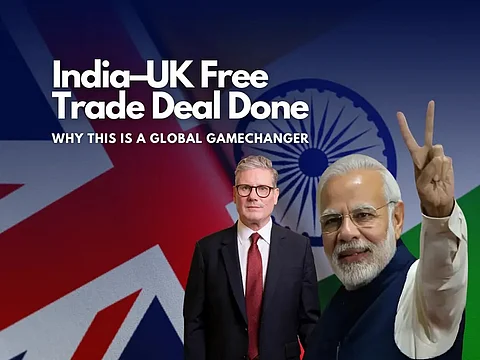

Indian Prime Minister Narendra Modi's two-day visit to the United Kingdom on July 23-24, 2025, received considerable attention from major British media, including outlets such as the BBC, The Guardian, The Sun, and The Daily Telegraph. The visit has been characterized as a crucial step in enhancing economic, strategic, and cultural links between the two nations. Key headlines revolved around the signing of a landmark Free Trade Agreement (FTA), interactions with the Indian diaspora, and high-level diplomatic activities. Below is a summary of how various prominent British media covered Modi's visit.
Milestone in UK-India Relations - BBC
BBC portrayed Modi's visit as a “milestone in UK-India relations,” with a strong focus on the FTA, which it termed the bedrock of future economic cooperation. The coverage emphasized the agreement’s potential to increase British exports, including whisky and automobiles, to India while reducing tariffs on 99% of Indian exports to the UK.
Prime Minister Keir Starmer’s comments about the FTA being “the biggest and most economically significant bilateral trade deal” post-Brexit were noted. The report also featured Modi's meeting with King Charles III, underlining its significance for cultural ties. While the BBC provided a balanced perspective, acknowledging concerns from some UK groups regarding India’s domestic policies, particularly human rights; it ultimately framed the visit as a diplomatic triumph.
FTA Boost for UK-India Ties - The Guardian
The Guardian concentrated on the strategic aspects of Modi’s visit, particularly the reassessment of the India-UK Comprehensive Strategic Partnership (CSP). It reported on the extensive discussions between Modi and Starmer about trade, technology, defense, and climate initiatives. Modi's ambition to double bilateral trade to $120 billion by 2030 was highlighted, along with the FTA's role in achieving this target. The publication also covered Modi's engagement with the Indian diaspora in London, depicting the warm reception from community leaders and students. However, it included reflections on the protests surrounding India's domestic policies and the Khalistan movement, noting these concerns were somewhat overshadowed by the positive diplomatic results.
“The Sun” Tabloid Highlights Populist Angle
The Sun adopted a more populist angle, focusing on the “cheering crowds” that welcomed Modi in London and celebrating what it called a “historic” trade deal. The tabloid emphasized the potential benefits for British consumers, such as access to cheaper Indian goods and uplift in UK whisky exports. Coverage included Modi's interaction with British Indian businessman Lord Rami Ranger, who described the FTA as a “win-win” for both countries.
The Sun’s account featured vivid imagery of Modi's ceremonial arrival and the presence of community leaders, showcasing the strength of the Indian diaspora in the UK. While it briefly mentioned tensions regarding the Khalistan issue, the focus remained on the celebratory elements of the visit.
FTA Is A Game-Changer: The Daily Telegraph
The Daily Telegraph provided a comprehensive analysis of the visit's geopolitical and economic ramifications. It referred to the FTA as a “game-changer” for UK-India relations, noting that the agreement, finalized after three years of negotiations, would necessitate British Parliamentary approval. The newspaper highlighted Modi’s talks with Starmer on defense, technology, and climate collaboration, presenting the visit as a strategic counterbalance to China’s growing influence in the Indo-Pacific region.
Modi's meeting with King Charles III was also reported, emphasizing the cultural and historical connections between the nations. Despite mentioning the protests, the Telegraph framed the visit as a strategic effort to enhance the UK's engagement with the Global South.
Global Power Play: Modi's UK Visit Reshapes Indo-Pacific Focus
Overall, the signing of the India-UK FTA emerged as a central theme across these media outlets, with commentary on its potential to reshape trade ties and stimulate economic growth. The visit was positioned as part of Modi's ongoing global diplomatic outreach, following a recent tour that included visits to Ghana, Trinidad and Tobago, Argentina, Brazil, and Namibia. British media also noted Modi's invitation for Starmer to visit India, signaling a commitment to further strengthening bilateral relations. The collective coverage reflected a mix of optimism regarding economic prospects and sensitivity to contentious issues, such as protests related to India’s domestic policies and the Khalistan movement. Nevertheless, the prevailing tone across media outlets was largely positive, emphasizing the visit's role in elevating the UK-India partnership to new heights.
